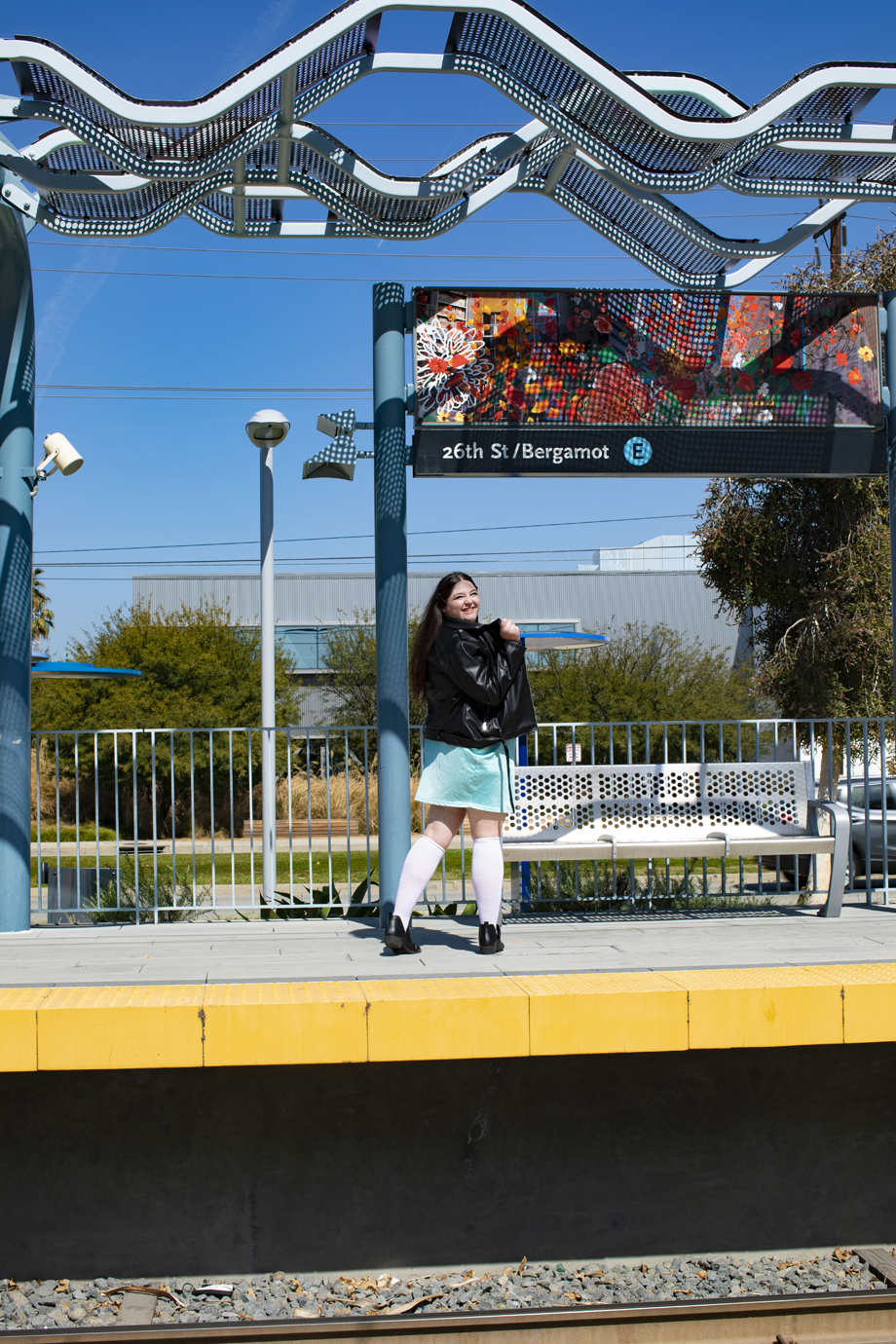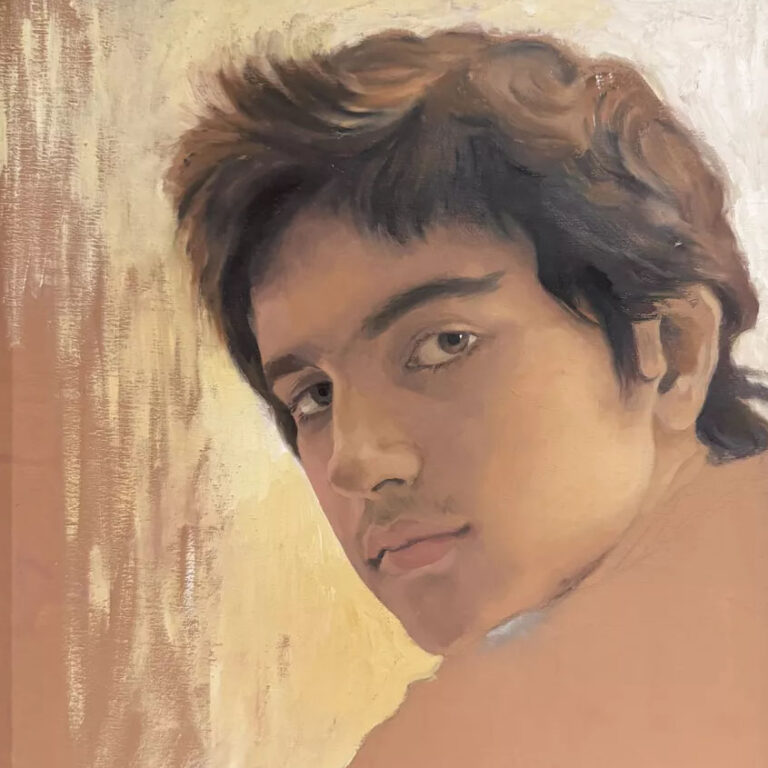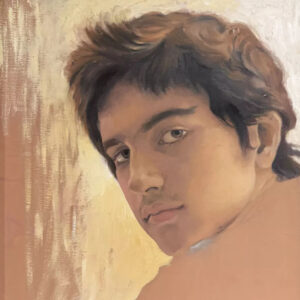
When I think about Megan Stalter, I think of beanbags, wall-to-wall carpeting, hobbies, Starbucks, parking lots, tube tops and dreams. I think about the sadness and wonder of living through such a lonely time. I think of mediocre hotel swimming pools, panic attacks and palm trees. The Megan Stalter persona possesses an unhinged basicness taken so far it folds in on itself, interrupts its own flow and glitches out. Megan Stalter’s Twitter banner at the time of writing this was a photo of a Panera Bread drive-thru.
I consider the hermeneutics of Panera. The first time I went to one I was teaching theater to precocious teens at a performing-arts high school in New Jersey. The experimental playwright who got me the gig drove us to Panera on our lunch break. The only other option was a Pirate-themed hybrid burger joint/strip club and it didn’t seem appropriate to eat there and then go right back to teaching minors. The second day of our workshop we lunched at the Pirate sex burger disco; Panera was too depressing to return to two days in a row.
Gazing at Megan Stalter’s Twitter banner, Panera Bread suddenly feels like the key to everything. The corporate American bakery occupies that same Megan Stalter sweet spot of delusional aspiration: a strip-mall chain pretending it’s a European cafe. Panera Bread is operated by the same corporation as Au Bon Pain, which I can never help but read as “Oh Good Pain.” The name has always sent a shiver right through me. Panera Bread was also, at one time, the largest provider of free WiFi in the whole United States, a factoid which somehow breaks my heart. I wish I could be meeting Megan Stalter at a Panera Bread in her hometown of Dayton, the sixth-largest city in Ohio and home to the National Museum of the Air Force. We could sit in Panera and watch life go by. I’d describe all the details that comprise the gentle dance of humanity, these sweet and wretched American lives ordering a Southwest Chile Lime Ranch Chicken Salad as democracy collapses.
But, in our ongoing pandemic-induced isolation, the norms of the profile form no longer hold, as we are denied the pleasure of observing and divulging the physical details of our subject’s world: the stuffed unicorn mounted on the wall at magician Derren Brown’s house or the blue-haired wife of the saloonkeeper at Frank Sinatra’s favorite bar—a woman they called the “Blue Jew” and who I always hope to meet in a dream. Given the circumstances, it really depressed me that I couldn’t spend a day or two actually meeting up with Megan Stalter at Panera and then cruising to a local parking lot at dusk for a chance to describe the signage and the charming regulars in lawn chairs and the junk-food packaging that might roll by like tumbleweeds. But in these months which may become years, the world is a rectangle: the most responsible way to commune with others is to stare directly into one’s own phone.
This is a state of affairs Megan Stalter understands intimately, as the anointed queen of quarantine comedy. She gets up in the morning and makes at least 5 or 6 Cameos, mini masterworks of derangement for which fans pay $45 to send a personalized video to, say, a brother who just graduated from the University of Houston. She does lots of emails and lots of Zooms. Sometimes she records a cartoon voice, sometimes it’s a podcast. She constantly thinks up ideas for videos, putting out a new one every couple of days. And, in those delirious first months of lockdown, she livestreamed demented themed experiences for hours nearly every night, often as masterclasses in bungee jumping, or watercolor, or understanding what’s funny about Megan Stalter’s comedy. I show a video to my little brother and he says, “What is this?” Exactly. “She parodies how people are… on the Internet?” In part.
The sound on her videos cuts in and out, her body on screen splinters into squares, words trip over themselves and escape transcription. Megan Stalter is constantly glitching, an aesthetic strategy that draws in part from a lineage of Internet glitch performance instigated by queer BIPOC artists. As Legacy Russell writes in her 2020 manifesto Glitch Feminism, “A glitch is an error, a mistake, a failure to function. Within technoculture, a glitch is part of machinic anxiety, an indicator of something gone wrong… The glitch aims to make abstract again that which has been forced into an uncomfortable and ill-defined material: the body.” Video chatting, our conversations look eerily like her livestreams, as I am beamed right into a Megan Stalter set: her little brother’s living room in Ohio. She shows me the Halloween themed acrylics her younger sister foisted upon her and we talk about how truly debilitating fake nails can be.
She tenderly gestures towards a nearby beanbag, sent to her as promo. (“This is the beanbag we love. Everyone should have a beanbag.”) We talk about the Church, the Internet and how nervous she gets ordering coffee at Starbucks. Afterwards, I’m left with a familiar quar feeling: intensely intimate pixelated engagement, then jolted back to being alone in my bedroom, wondering in my default mode about the point of life.

Internet performance is like an omelet made of synthetic egg; it tastes kind of like the real thing and you’re hungry so you eat it but it doesn’t quite nourish you—there’s a sense of emptiness when it’s done, and maybe you feel a bit ill. This is a strange time for live comedy where the place it used to happen doesn’t exist. We all deal with this hollow sense of no-place differently—humans, I mean, and also comedians. Performers with no place to perform all have our meaning-making fixations. I, for instance, became obsessed with compost. I was soothed from March through September only by the knowledge that to accelerate the rot, everything needs to be ripped to shreds. I spent lockdown on my fire escape tearing up cardboard boxes from everyone’s Internet orders and watching my neighbor call out after his seemingly unnamed dog, “Dog? DOG!” Megan Stalter decomposes daily as well, falling apart for legions of online followers who get to know the subtle minutiae and permutations of in-jokes and references, allusions and callbacks, patterns and surprises, in a baffling outpouring of what we call content. “I get a lot of good out of it,” says Meg, “But I don’t think being on your phone all day is good. Ask yourself: ‘Am I online because I’m connecting with people or am I scrolling because I’m having an anxiety attack?’”
In 2020 the COVID-19 pandemic resulted in the closure of live comedy venues and a subsequent “pivot” to front-facing camera comedy. That’s from the Wikipedia entry on front-facing camera comedy. New York Times comedy critic Jason Zinoman, who once politely yet firmly declined an invitation to a show of mine, has declared front-facing camera comedy the dominant comedy form of the COVID-19 crisis. But what I’m really interested in is this word, “pivot.” When was it decided we all had to pivot?! Or that some of us pivoted and others… didn’t. Now that your life is over, how have you pivoted? You pivot, I pivot, she pivots, we pivot! We’re in the middle of a pandemic and goddammit, we’re pivoting!
The pivot is the central axis on which a mechanism rotates—the turning point on which some matter depends. Etymologically, pivot apparently comes from an old French word for “penis.” Fitting since, despite it all, we’re expected to keep thrusting, cascading our seed out into the ether, determined to spread beyond ourselves. These days, a pivot most often refers to a career move, more recently in reference to COVID-19. In a world of lies, the dictionary tells the truth. Since everything in life that you cared about was canceled, could you tell us a bit about your penis?
Megan Stalter has pivoted magnificently. “I’ve never felt more connected to God and the world than right now,” she says. “We have all had hell this year. It’s allowed me to think that what God or the universe really wants from us is to take care of each other all the time. I do feel closer to people who follow me now, because everyone needs it more. The numbers have grown.” The genius of her comedy is an exploration of precisely this human contradiction: where holy intentions meet megalomania. Megan Stalter’s comedy is shot through with an insecure, desperate, deluded humanity in which the horror of being a person manifests in minutiae. It has an honesty about the lengths we’ll go to for attention, to feel loved and to find a sense of meaning amidst the banal hellscape of existing. Her work is a meta-pivot: the point around which she turns is that there is no point except to keep turning.
As I write I fall deeper into despair. What about everyone who can’t pivot so well? In dance, a pivot is a spin anchored by stepping out steadily onto one foot and then using the other to sweep yourself in the opposite direction. If I can’t pivot, then that means I’m just awkwardly standing here, trying to place one foot forward into a world that no longer exists. I’m the Fool in the tarot deck, paused at the cliff of the abyss, a little zero above my head while Meg Stalter’s chihuahua yaps at my heel.
But even the Queen of Coins weeps: “I love doing Instagram lives and all this stuff, and people are watching,” Meg sighs, “But you can’t replace the live feeling. We were addicted to that and it’s gone. I really miss performing live. The first couple months I couldn’t even look at certain outfits without sobbing.”
I was, of course, very jealous the first time I saw Megan Stalter perform, live and in-person, when it was a normal activity to sit close together and breathe in windowless rooms. Back then, we even spat liquids onto one another’s faces when the occasion demanded, for what is the height of uncontrollable guffaw if not the spit-take? Watching Megan Stalter perform I felt almost too jealous to laugh, but not quite, because what I also felt was confused, and confused is one of my favorite things to feel. Confused is a feeling I seek out and surf, like Hamlet, = Shakespeare’s melancholic prince of Denmark, unable to navigate a rotten reality but indulging in the accompanying fracture of self. A Megan Stalter performance recalls the sensation I had when my little brother and I stumbled upon a public-access TV show one Christmas back in 1996. A woman was singing fairly badly but not terribly on her couch for a very, very long time, while an electric yule log burned and burned. I have been trying to get back to that feeling ever since. (“What is this?” Exactly. “Is she parodying how people are…?” In part.)
Megan Stalter’s delusional sticking-to-it-ness makes every beat an opportunity for linguistic stumbling wherein she chews and chomps up words that stutter forth into a strut, tripping and retreading (n)ever closer to some point that doesn’t matter. Two steps forward, and two and a half dancing backwards in heels. How could a woman take the stage and be both so utterly inept and yet so bafflingly self-assured? And how might I, too, somehow reach this same height of deranged confidence, a confidunce confidancing with myself?
Magda San Millan, whose choreographic practice encompasses stand-up about changing dirty diapers and paintings of men being devoured by their own cocks, says of Stalter’s work: “I like her spoken sloppiness. She regularly shits on grammar and sentence cohesion in an urgent way, as if she needs and trusts us to get to the point without her fully articulating it. And when I saw her live she was an asshole to the audience. But a giggly asshole.” I don’t remember specifics from Meg’s show that blurry night in February just before the lockdown, but the feeling that remains for me is potent and shapely and could be described something like:
Shimmying sideways in glittery slingbacks with a twisted ankle and a pedicure the creamy green of Fort Lauderdale key lime pie. Or: A stick of salted butter that knows it deserves center stage but starts melting in the stage lights—then realizes we love a meltdown most of all, this glorious and sticky loss of form. The performance makes us realize we want to melt down, too, and be this honest about our desire to be famous, our secret conviction that we should be famous, our utter failure to be famous (meanwhile, something is rotten in the state of Denmark). I was most struck by Megan’s lovable brashness—brusque, deranged, tender directing and dismissing the audience in a vibratory hum of desperation. “I need you so bad I’m gonna cry and clog this mic with my snot but you need me more so c’mere and slurp my snot!” is kind of the vibe I recall. A bit of a Santa Claus dynamic: I squeeze down this damn chimney to bring you my gifts, yet without you, I have no purpose. Leave me milk and cookies so I know you care; I’ll spill the milk on the carpet so you know I was here. No use crying over spilt milk, unless it makes for good TV.

I ask Meg about her worst show. Is it possible, when the whole shtick is that it’s not working, for something to still just not work? “I was doing a fake blood bit where I start talking and blood comes out of my mouth. It was so wrong for the venue. Usually the blood comes out and everyone erupts in laughter but it was totally silent and then some lady was like, ‘Are you okay?’ I had to do my whole set with blood all over my face while everyone's for real worried. The whole time you're thinking to yourself: ‘They just don’t get it.’ Honestly, when it’s bad it’s so funny. Some of the people get it and some of the people don’t, but the people who do get it think it’s even funnier that the other people don’t.” (I’ve taken to this as advice for life: When things are going horribly, just imagine a cosmic audience laugh-crying along with you at the absurd and bloody shit show you’re somehow starring in.)
Megan Stalter’s videos extend this virtuosic ode to floundering in little off-key ditties of amour to the wildly insufficient ways one might attempt to cope with the ongoing collapse of both capitalism and meaning by, say, rearranging house plants in an overly floppy hat. Megan Stalter’s characters are often on the brink of tears, a ring light visible in their eyes like a circle of Hell in Dante’s Inferno, or tugged into view with a nonchalant Brechtian display of artifice. Drawing on a comedic trend of the deluded female performer who thinks she’s a star, the trope offers itself as a parody of fame-hungry me-culture while also embracing its trappings, at times “leaning in” so far that the critique tips over into the very thing it purports to ridicule. An undercurrent of Stalter’s videos is a delight in mocking cis white woman heteronormativity and the displays of victimhood that can slip with insidious ease into dangerous defensiveness. Variations on a theme, the white woman in one sketch who asks for “Thai—not spicy!” is a version of the white woman in another who says, with a self-satisfied shrug, “I had to call the police on her. Sorry! I’ll do it!” The white woman who says, “ Mi amor, pass me the fern!” is a version of the white woman who says, “This is a court of law, gurly!” A performative fragility belies a violent demand for her comfort and safety to be prioritized at all times.
I finally admit nervously to Meg that my interest in her work is in part anthropological: her bits offer me a wee peek into a Midwestern Christian white America in the midst of its own self-reckoning. I’m fluent in the gorgeous comedy of extremely Jewy Jews (Sarah Squirm, Lenny Bruce, Larry David, my mom) and those I might call honorary Jews (Lorelei Ramirez, Ruby McCollister, Gritty) but truth be told I have had few encounters with Stalter’s brand of post-Pentecostal humor (she grew up in the church and says there’s truly nothing like speaking in tongues). Megan reassures me, “I’m really obsessed with all Jewish holidays” and then explains: “The people I’m making fun of are people I know in Ohio. They’re all very Midwestern characters—people who want to seem kind but they’re not. There’s goodness here, too, but the commentary is embedded in all of these characters. I never wanted to do characters who are weird and random just for the sake of being weird. These characters believe all this bad stuff but they’re trying to be good people. No one’s all good or all bad. I like to do characters that feel really real, and those are the people I grew up with.”
Megan had barely made the move to NY from Chicago when the pandemic hit and she decamped to her family home, a chance to further study her surroundings. There she found the ideal straight man and collaborator in her brother, Nick Stalter, who shot and edited their YouTube magnum opus Little Miss Ohio and can be heard muttering throughout the special, “that was for my boys in editing.” The film has the tone of a Christopher Guest movie made by the Kuchar brothers, splicing found footage of beauty contestants with a motley array of character studies: lady who posts up early in a beach chair in the casino parking lot every day to snag her favorite slot machine; woman who has decided to live permanently at the Marriott hotel pool following the death of her husband; woman pretending to be a longtime Denny’s waitress; girl in church youth group leaving too many voicemails. What the characters share is a commitment to living in a fiction, banal yet romantic, stars of a biopic nobody made in the middle of a country that’s falling apart. To my coastal elite ear, Megan Stalter’s flat Midwestern accent is most audible at the A in phrases like “I’m having a full-on panic attack” or “I’m going to drink that Lysol and pass out” (these declarations brought on because her podcast guests all failed to show). In a beguiling mixture of utter casualness combined with trying too hard, a hyperbolic suicidality is at the core of her appeal. Her rise to fame as queen of front-facing camera comedy coincided with a moment when the president was instructing citizens to drink bleach. Megan Stalter’s comedy thrives in this desire for self-combustion in full view, brought into the realm of the utterly “relatable.” Who isn’t having a panic attack and craving some Lysol? “All the characters I keep as my name,” Megan Stalter tells me. “I’m always like ‘I’m Megan Stalter.’ They’re all versions of the same person and they’re all delusional. Their life is going really bad but they’re trying to act like it's not." Amen.
Craving more culture? Sign up to receive the Cultured newsletter, a biweekly guide to what’s new and what’s next in art, architecture, design and more.










 in your life?
in your life?

